World Geography And Politics Daily News | 18 May 2023

Views (208)
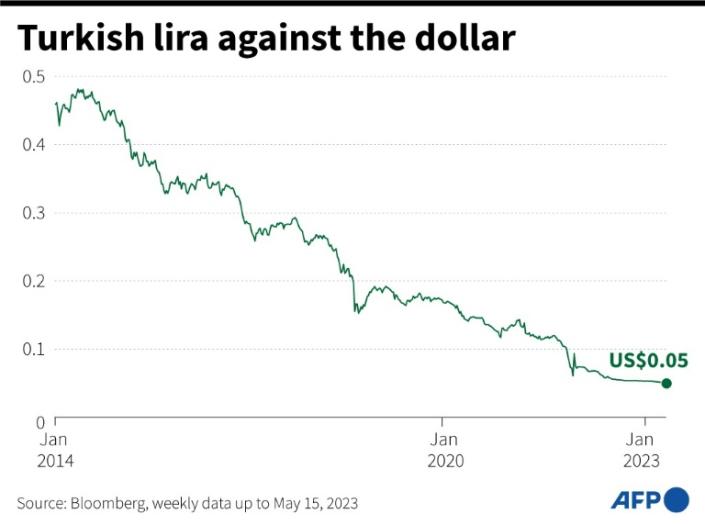
Sudan's Darfur conflict: Why an accountant took up arms
Sudan's western region of Darfur has seen some of the worst fighting recently, including ethnic attacks.
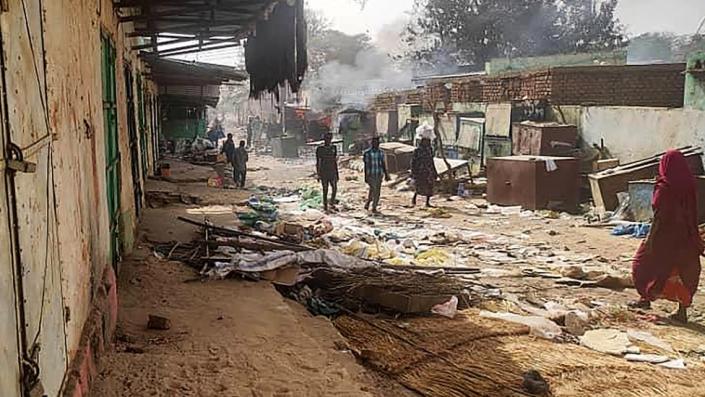
Accountant Mohamed Osman has been forced to pick up an AK-47 rifle for the first time in his life to defend his neighbourhood as the conflict in Sudan escalates, inflaming racial tensions between Arabs and other groups in the country's volatile Darfur region.
Mr Osman lives in El Geneina, historically a symbol of black African power in Darfur, that has been shelled, burnt and looted by the paramilitary Rapid Support Forces (RSF) and allied Arab militiamen. Their notoriety has earned them the nickname Janjaweed, an Arabic word for "devils on horseback" .
"I've never seen such a thing in more than 20 years of war in Darfur. It's awful," Mr Osman, 38, said. We have changed his name for his own safety.
"Whenever there is an attack by the Janjaweed here in El Geneina, their fellow tribesmen come with their arms from across the border in Chad on motorbikes and on horsebacks to assist them," he told the BBC from his home in the northern Ardamata neighbourhood.
Mr Osman's office, in the city centre, is a burnt-out wreck.
"I can't go there, let alone work," he noted, in a matter of fact way.
Another resident, Mohammed Ibrahim, said the city had been taken over by the RSF and Janjaweed, with snipers positioned in buildings and gunmen on streets.
"They're just shooting every place. If you go outside you'll be killed. You can't move, even 200 or 300 metres," Mr Ibrahim told the BBC. His name has also been changed.
Medics reported that at least 280 people have been killed and 160 have been wounded in El Geneina in the last few days alone.
The latest violence is seen by analysts as a clear breach of the 11 May Saudi-brokered agreement between the RSF and the Sudanese army to alleviate the suffering of civilians, while talks aimed at reaching a ceasefire continue in Jeddah.
Mr Osman said that as the fighting advanced closer to Ardamata in recent days, he and many other men in his neighbourhood got AK-47 rifles and began carrying out 24-hour patrols in shifts.
This was something he never imagined doing, as his life used to revolve around keeping track of the finances of his clients.
"We have no choice but to arm ourselves and defend our city," Mr Osman said, pointing out that he could not risk exposing his family - including his mother, sisters, nieces and nephews - to the much-feared paramilitaries and militiamen.
Asked how he acquired his Soviet-made Kalashnikov rifle, he replied wryly: "The cheapest thing you can buy here is a weapon."
In contrast, food has become scarce and prices have rocketed as the RSF and Janjaweed set markets ablaze.
"They even burnt the food and flour that was stored in the markets, as if they want the survivors of bullets to die of hunger," said Ishaq Hussein, a former worker at a non-governmental organization in El Geneina.
The BBC has been unsuccessful in attempts to reach the RSF for comment.
With a population that was put at around 170,000 in the last census in 2010, El Geneina is the traditional capital of the Massalit kingdom, making it a target for the Janjaweed. They have long been accused of ethnic cleansing against non-Arab groups in Darfur.
"The Janjaweed are killing all the African people starting with the Massalit," Mr Ibrahim said.
Conflict first erupted in Darfur in 2003 when mostly non-Arabs took up arms against the government, complaining about discrimination and a lack of development.
The government retaliated by mobilising the Janjaweed, and later welding them into an estimated 80,000 to 100,000-strong paramilitary force that has now turned on Sudan's military ruler Gen Abdel Fattah al-Burhan, and the army he commands.
The RSF launched an assault on the capital Khartoum on 15 April, with the military retaliating with daily air strikes in a bid to regain control of the city.
But in El Geneina, there is no attempt to fight back against the RSF and the Janjaweed.
"There's a zero presence of the army or any other government body to protect the civilians," Mr Ali said.
The Norwegian Refugee Council (NRC) estimates that about 100,000 people have fled their homes in the city, and remain "at the mercy of the relentless violence, with settlements once again being reduced to ashes".
"We are still unable to deliver emergency aid," NRC added in a statement.
Mr Ibrahim said that water supplies had also been cut.
"Water is a big problem for everyone, even for the donkey," he said.
He made a desperate plea for international help, saying the city has been under attack for 23 consecutive days.
"A lot of injured people don't have any type of treatment, more than hundreds and hundreds and hundreds," Mr Ibrahim said.
He added that he was alone at home, having sent his wife and family to safety.
"I have kids and it's difficult for them to be hearing these guns every day. That's why I sent them out," he said, pointing out that families tend to leave in guided groups before sunrise, when the risk of being confronted by the RSF and Janjaweed is less.
Mr Osman said that if the security crisis deepens, he too will flee to Chad to live in make-shift camps.
"If this does not stop by the mercy of Allah, I will take my family and run to Chad to stay in a shelter built with our clothes rather than being killed here," he said.
UN expert: Myanmar military imported $1 billion in weapons since 2021 coup
Myanmar’s military has imported at least $1 billion worth of weapons and related material from Russia, China and other countries since its February 2021 coup, some of which it has used to carry out atrocities against civilians, according to a U.N. report released Wednesday. The weapons continue to flow to the military despite overwhelming evidence of its responsibility for the atrocities, including some that amount to war crimes and crimes against humanity, said Tom Andrews, the U.N. independent investigator on human rights in Myanmar. As an example of what he called the junta’s brutality, Andrews pointed to its April 11 airstrike using a Russian Yak-130 fighter jet on a ceremony attended by some 300 opponents of army rule, which was quickly followed by an attack by Russian Mi-35 helicopters on those who came to help.
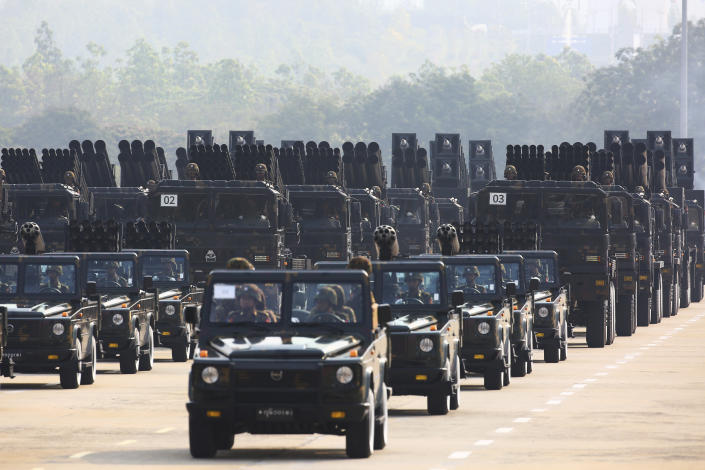
UNITED NATIONS (AP) — Myanmar’s military has imported at least $1 billion worth of weapons and related material from Russia, China and other countries since its February 2021 coup, some of which it has used to carry out atrocities against civilians, according to a U.N. report released Wednesday.
The weapons continue to flow to the military despite overwhelming evidence of its responsibility for the atrocities, including some that amount to war crimes and crimes against humanity, said Tom Andrews, the U.N. independent investigator on human rights in Myanmar.
As an example of what he called the junta’s brutality, Andrews pointed to its April 11 airstrike using a Russian Yak-130 fighter jet on a ceremony attended by some 300 opponents of army rule, which was quickly followed by an attack by Russian Mi-35 helicopters on those who came to help. He said at least 160 people were killed, including many children.
In addition, the machine guns and bombs used in the attacks included parts and materials from companies located in Singapore, China and Thailand, he said.
Myanmar is mired in strife because of a political crisis unleashed when the military took power. Its takeover prompted widespread peaceful protests that security forces suppressed with deadly force, triggering armed resistance throughout the country that the army has been unable to quell. Andrews said at least 22,000 political prisoners have been detained since the coup, at least 3.500 civilians have been killed and 1.5 million people have been forcibly displaced.
The report documents over 12,500 purchases that were shipped directly to the Myanmar military or known Myanmar arms dealers working for the military from Feb. 1, 2021, when the military ousted the elected government of Aung San Suu Kyi, until December 2022, Andrews said at a news conference.
He said the volume and diversity of equipment the military received was “staggering,” ranging from fighter jets and attack helicopters and drones to advanced missile systems, tank upgrades, sophisticated communications equipment, radar complexes and components for naval ships.
Andrews, a former Democratic congressman from Maine , said he had received “highly credible and detailed information from confidential sources” identifying the major networks and companies involved in the arms trade with Myanmar.
The report to the Geneva-based Human Rights Council identifies $406 million in weapons and material that went to the Myanmar military from Russia, $267 million from China, $254 million from Singapore, $51 million from India and $28 million from Thailand.
Since the coup, the report said, 28 Russian private and state-owned companies have transferred fighter jets and their spare parts, advanced missile systems, reconnaissance and attack drones, attack helicopters and other systems to the junta.
The report identified 41 private and state-owned companies registered in China and Hong Kong that supplied the Myanmar military with an extensive array of arms, equipment and raw materials between October 2021 and December 2022, including advanced trainer jets, light attack aircraft, tank upgrades and repairs for Chinese fighter jets, which make up the Myanmar Air Force fleet, the report said.
They also supplied aluminum, copper, steel, rubber and lubricants for use in Myanmar’s domestic weapons manufacturing, it said.
Unlike with Russia and China, and to a lesser extent India, Andrews said he received no information indicating that the governments of Singapore or Thailand approved or transferred arms to the Myanmar military.
He said companies in Singapore are of critical importance to the junta, having supplied spare parts, raw materials and manufacturing equipment, especially for Myanmar’s KaPaSa weapons factories. Thai companies have done the same, the report said.
Twelve Thai companies were established after the coup, many by sanctioned arms networks already operating in Singapore, which suggests arms dealers may be looking at Thailand as an alternative route to avoid scrutiny, the report said.
Andrews said Singapore has a policy prohibiting the transfer of arms to Myanmar, and he reported his detailed findings to the government, which he said expressed appreciation for the information and indicated it was reviewing the effectiveness of its export controls.
If the Singapore government stopped all arms shipments to the Myanmar military, he said, the impact on the ability of the junta to manufacture arms “would be significant.”
Andrews said China and Russia both criticized the report, saying it went beyond his human rights mandate, and accused him of “vilifying legitimate arms trade.” He countered that “identifying the sources of gross human rights violations and atrocities, including crimes against humanity and war crimes, is within my mandate and in my moral obligation.”
Andrews said India responded to the report’s findings that 22 state-owned and private firms shipped a coastal surveillance system, a remote-controlled weapons system, components from an ammunition and missile manufacturer, and 122 mm howitzer barrels by saying these involved contracts with the previous civilian government.
A U.N. General Assembly resolution adopted on June 18, 2021, calls upon all member states to prevent the flow of arms into Myanmar, but unlike a Security Council resolution it is not legally binding. The United States, United Kingdom, European Union, Canada and Switzerland have imposed sanctions on arms dealers providing support to the military.
Andrews said the sanctions weren't coordinated and have been largely ineffective. He called for countries to impose coordinated sanctions that target the networks that procure weapons and also the junta's finances.
The likelihood that Earth briefly hits key warming threshold grows bigger and closer, UN forecasts
There's a two-out-of-three chance that the world will temporarily hit a key warming limit within the next five years, the United Nations weather agency said Wednesday. Scientists expect a temporary burst of heat from El Nino — a naturally-occurring weather phenomenon — to supercharge human-caused warming from the burning of coal, oil and gas to new heights. The World Meteorological Organization forecasts a 66% likelihood that between now and 2027, the globe will have a year that averages 1.5 deg
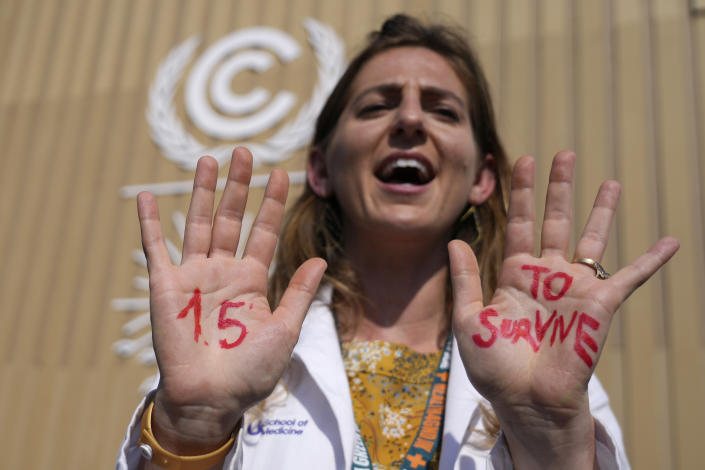
The World Meteorological Organization forecasts a 66% likelihood that between now and 2027, the globe will have a year that averages 1.5 degrees Celsius (2.7 degrees Fahrenheit) warmer than the mid 19th century.
“It won’t be this year probably. Maybe it’ll be next year or the year after” that a year averages 1.5 degrees Celsius, said report lead author Leon Hermanson, a climate scientist at the United Kingdom’s Met Office.
But climate scientists said what's likely to happen in the next five years isn't the same as failing the global goal.
“This report does not mean that we will permanently exceed the 1.5 C level specified in the Paris Agreement which refers to long-term warming over many years. However, WMO is sounding the alarm that we will breach the 1.5 C level on a temporary basis with increasing frequency,” WMO Secretary-General Petteri Taalas said in a statement.
“We haven't been able to limit the warming so far and we are still moving in the wrong, wrong direction,” Taalas said at a Wednesday press conference.
Hermanson cautioned that "a single year doesn’t really mean anything.” Scientists usually use 30-year averages.
The world has been inching closer to the 1.5-degree threshold due to human-caused climate change for years. The temporary warming of this year's expected El Nino — which starts with a warming of parts of the central Pacific Ocean and then sloshes across the globe — makes it "possible for us to see a single year exceeding 1.5 C a full decade before the long-term average," said climate scientist Zeke Hausfather of the tech company Stripe and Berkeley Earth, who wasn't part of the WMO report.
“We don't expect the longer-term average to pass 1.5 C until the early-to-mid 2030s,” Hausfather said in an email.
But each year at or near 1.5 matters.
“We see this report as more of a barometer of how we're getting close, because the closer you get to the threshold, the more noise bumping up and down is going to bump you over the threshold randomly,” Hermanson said in an interview. And he said the more random bumps over the mark occur, the closer the world actually gets to the threshold.
The La Nina somewhat flattened the trend of human-caused warming so that the world hasn't broken the annual temperature mark since 2016, during the last El Nino, a super-sized one, Hermanson said.
And that means a 98% chance of breaking the 2016 annual global temperature record between now and 2027, the report said. There's also a 98% chance that the next five years will be the hottest five years on record, the report said.
Because of the shift from La Nina to El Nino “where there were floods before, there will be droughts and where there were droughts before there might be floods,” Hermanson said.
The report warned that the Amazon will be abnormally dry for a good part of the next five years while the Sahel part of Africa — the transition zone between the Sahara on the north and the savannas to the south — will be wetter.
That's “one of the positive things coming out of this forecast," Hermanson said. “It's not all doom-and-gloom and heat waves.”
University of Pennsylvania climate scientist Michael Mann said reports like this put too much emphasis on global surface temperature, which varies with the El Nino cycle, even though it is climbing upward in the long term.
“I think it’s important to realize that if we pass 1.5 degrees it’s not a reason to give up,” Hermanson said at a Wednesday news conference. “We have to continue working out how much we can reduce emissions of greenhouse gases as much as possible, even after that, because it will make a difference.”
___
___
___
Automaker warns over UK operations and calls for Brexit trade deal renegotiation
The world's fourth-biggest carmaker by sales has warned of a potential existential threat to large parts of the British car industry unless the government moves to alter the terms of its Brexit trade deal with the European Union. In a submission to a parliamentary inquiry into the supply of batteries for electric vehicles released Wednesday, the parent company of Citroen, Fiat, Peugeot and Vauxhall said it may not be able to keep its commitment to manufacture its new fleet of cars in the U.K. wi

LONDON (AP) — The world's fourth-biggest carmaker by sales has warned of a potential existential threat to large parts of the British car industry unless the government moves to alter the terms of its Brexit trade deal with the European Union.
In a submission to a parliamentary inquiry into the supply of batteries for electric vehicles released Wednesday, the parent company of Citroen, Fiat, Peugeot and Vauxhall said it may not be able to keep its commitment to manufacture its new fleet of cars in the U.K. without changes to the terms of the deal.
Stellantis said the deal represented a “threat" to its export business and the "sustainability" of its manufacturing operations. The company employs 5,000 people in the U.K. and committed to make electric vehicles in the country two years ago.
The stark warning is likely to pile pressure on the Conservative government to seek changes to the trade deal that came into force at the start of 2021 when the U.K. formally left the economic structures of the EU, including the frictionless single market and customs union. Executives from Stellantis are due to meet with Britain's business secretary, Kemi Badenoch, on Wednesday.
Though the trade deal ensured that tariffs would not be slapped on the export of goods from the U.K. to the EU, an array of often-complex non-tariff barriers has made it more difficult, and often more costly, for British businesses to sell their wares in the 27-nation bloc. Some of these barriers are being phased in over time.
Former Chinese ambassador to Russia visits Ukraine
Li Hui, a special representative of the Chinese government who was China's ambassador to Russia for 10 years, visited Ukraine on 16-17 May. Source: website of the Ministry of Foreign Affairs of Ukraine Details: The visit reportedly took place further to agreements reached during a telephone conversation between Ukrainian President Volodymyr Zelenskyy and Chinese President Xi Jinping on 26 April.
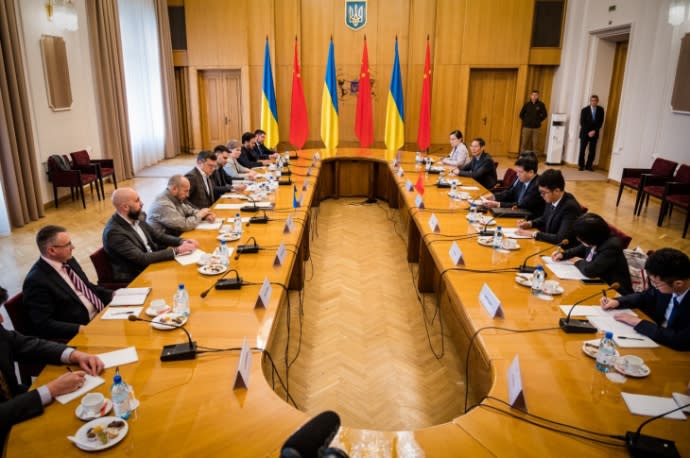
Li Hui, a special representative of the Chinese government who was China’s ambassador to Russia for 10 years, visited Ukraine on 16-17 May.
Details: The visit reportedly took place further to agreements reached during a telephone conversation between Ukrainian President Volodymyr Zelenskyy and Chinese President Xi Jinping on 26 April.
During the visit, Li met with Ukrainian Foreign Minister Dmytro Kuleba.
Quote: "The parties discussed topical issues of cooperation between Ukraine and China both at the bilateral level and within the framework of international organisations, as well as ways of putting an end to Russian aggression.
Kuleba gave China’s special representative detailed information on the principles of restoring a sustainable and just peace based on respect for the sovereignty and territorial integrity of Ukraine. He stressed that Ukraine does not accept any proposals that would entail loss of its territories or the freezing of the conflict.
The minister noted the importance of China's participation in the implementation of the Peace Formula proposed by the President of Ukraine, the Black Sea Grain Initiative, ensuring nuclear safety, and other important international efforts.
The parties separately discussed the long-term development of bilateral relations between Ukraine and China and agreed to increase dialogue on key issues on the bilateral and international agenda."
Li met with Kuleba
photo: mfa
Background:
Li was China's ambassador to Russia from 2009 to 2019.
Turkey's opposition plots fightback against Erdogan
Turkey's opposition tried on Wednesday to recover from a crushingly disappointing election performance and launch a new attack aimed at beating President Recep Tayyip Erdogan in a May 28 runoff."Putin gives Erdogan another diplomatic win ahead of the 28 May presidential election run-off," Eurasia Group director Emre Peker said on Twitter.
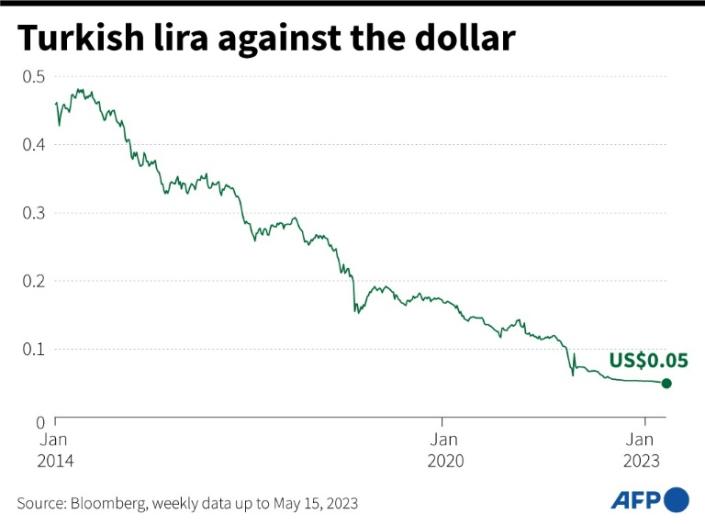
Turkey's opposition tried on Wednesday to recover from a crushingly disappointing election performance and launch a new attack aimed at beating President Recep Tayyip Erdogan in a May 28 runoff.
Secular leader Kemal Kilicdaroglu huddled with the other five heads of his alliance on Wednesday to plot a harder-edged strategy for ending Erdogan's two-decade domination of Turkey.
Media reports said he had fired his PR team and planned to tap Istanbul mayor Ekrem Imamoglu -- a feisty figure with a history of bad blood with Erdogan -- to spearhead his campaign.
The reported promotion of Imamoglu and the mayor's lauded strategist Canan Kaftancioglu marks a reversal for Turkey's grandfatherly opposition leader.
The 74-year-old former civil servant tried to run an inclusive campaign that addressed voters in chatty clips recorded from his kitchen and ignored Erdogan's personal barbs.
That approach worked -- up to a point.
The opposition deprived Erdogan of a first-round victory for the first time and collected more votes than in any point of his rule.
But Kilicdaroglu's 44.9 percent still trailed Erdogan's 49.5 percent of the votes.
Pre-election polls showed Kilicdaroglu leading and possibly even winning outright last Sunday.
- 'Fake world leader' -
Kilicdaroglu's fightback began with a video in which he stared straight into the camera and slapped his desk a few times after banging his heart with his fist.
"I am here! I am here!" he shouted. "I am here!"
He doubled down on Wednesday by calling Erdogan a "fake world leader" who "is now guided by Russia" -- a reference to Erdogan's increasingly close relationship with Vladimir Putin in the run-up to the campaign.
It did not take Turkey's 69-year-old leader long to strike back.
"All they do is bang on the table," he said in a nationally televised appearance.
Erdogan then thanked "my precious friend, Russian President Putin" for agreeing a two-month extension of a deal under which Ukraine can send grain to world markets along the Black Sea.
The UN-backed agreement represented one of Erdogan's crowning diplomatic achievements when he helped seal it in Istanbul last July.
He mentioned it often in the campaign to show off his ability to raise Turkey's stature and influence on global events.
"Putin gives Erdogan another diplomatic win ahead of the 28 May presidential election run-off," Eurasia Group director Emre Peker said on Twitter.
- Powers of incumbency -
Erdogan is entering the runoff as the overwhelming favourite.
The advantage of incumbency gives him ample television airtime as well as support from local officials and government-aligned businesses.
Sunday's remaining votes went to a little-known ultra-nationalist who has much more in common with the right-wing Erdogan than the leftist Kilicdaroglu.
Erdogan said he would visit southeastern regions this weekend that were hit by a catastrophic February quake in which more than 50,000 lost their lives.
The president retained strong support in the area despite initial anger at the government's delayed search and rescue work.
Erdogan added that his team will be meeting with younger voters in Istanbul and Ankara to try and win in Turkey's two most important cities.
Imamoglu and Ankara mayor Mansur Yavas beat out Erdogan's allies in 2019 municipal polls.
- 'Credible and consistent' -
The campaign's second stage is being accompanied by Turkish market turmoil that has seen the lira near historic lows against the dollar.
Investors are starting to price in an Erdogan victory and the long-term continuation of his unconventional economic policies.
The cost of insuring exposure to Turkey's debt is rising out of fears that the country's once-vibrant banking sector could soon experience serious difficulties.
Erdogan's decision to force Turkey's central bank to fight historically high inflation with lower interest rates has put unprecedented pressure on the lira.
Analysts believe Erdogan tried to prop up the lira ahead of elections through indirect market interventions that drained Turkey's hard currency reserves.
His government also introduced rules that required banks to purchase more and more liras with their foreign currencies.
Some analysts warn Turkey might have to impose capital controls if Erdogan -- who has pledged to keep interest rates low as long as he remains in office -- does not reverse course.
"Our focus after the election will be whether the policy mix becomes more credible and consistent," the ratings agency Fitch said.
zak/imm/gw
0 Likes
